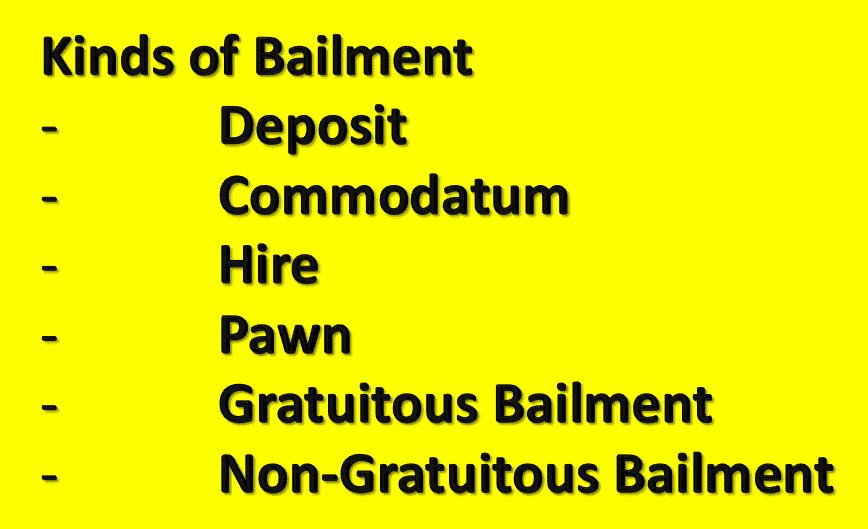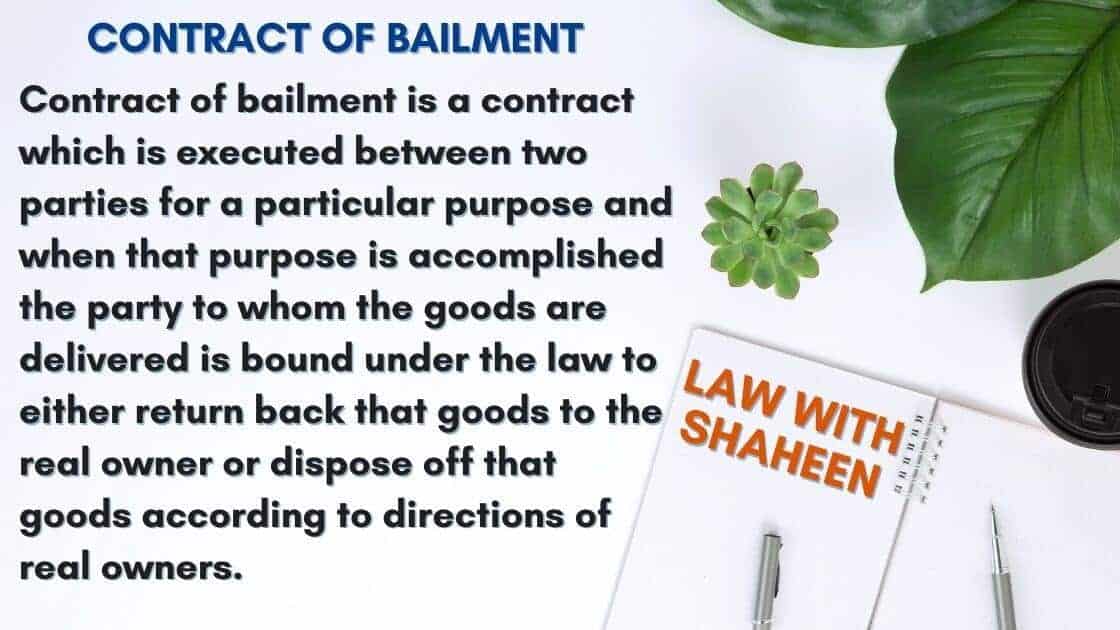Table of Contents
Contract of Bailment:
The contract of bailment is a contract that is executed between two parties for a particular purpose and when that purpose is accomplished the party to whom the goods are delivered is bound under the law to either return those goods to the real owner or dispose of that goods according to directions of real owners.
Relevant Provisions:
Sections 148, 150 to 154, 157 to 160, 162 to 166, 170, 180, and 181 of the Contract Act, 1872.
Meaning of Bailment:
According to Merriam-Webster Dictionary, the definition of bailment is;
“The transfer of the possession of goods by the owner (the bailor) to another (the bailee) for a specific purpose.”
Definition of Bailment:
According to Section 148 of the Contract Act, of 1872;
The definition of bailment is, “A bailment is a delivery of goods/products by one person to another for some purpose, upon a contract that they shall, when the purpose is accomplished, be returned or otherwise disposed of according to the directions of the person delivering them.”
Parties in Contract of Bailment:
There are two parties in the contract of bailment:
1). Bailor:
A bailor is a person who delivers property/goods to another.
2). Bailee:
Bailee is a person to whom the property/goods are delivered by the bailor.
Essential Elements of a Contract of Bailment:
According to Section 148 of the Contract Act, of 1872;
The following are the 4 essentials of the bailment in law.
1). Contract:
There must be a valid contract between the bailor and the bailee. The delivery of goods should be made under a contract. If the goods are delivered without any contract e.g. by mistake, there is no bailment. The contract may be expressed or implied.
2). Delivery of Goods(possession):
Delivery of possession is of two kinds:
Actual Delivery:
When the bailor hands over to bailee the physical possession of goods, it is called actual delivery.
Constructive Delivery:
When there is no change of physical possession, goods remain where they are, but something is done that has the effect of putting them in bailee’s possession, it is called constructive delivery.
3). Delivery must be for a specific purpose:
The bailment of goods is always made for some purpose and is subject to the condition according to the directions of the bailor.
4). Return disposal of deposit:
It is essential for bailment that when the purpose is accomplished, the goods must be returned in their original form or in changed form or disposed of according to the directions of the bailor.
Kinds of Bailment:

1). Deposit:
In this kind, the goods are delivered for the purpose of keeping.
2). Commodatum:
Where the goods are lent to a friend without any consideration, it is called commodatum.
3). Hire:
When the goods are delivered to the bailee for hire, it is the bailment of hire.
4). Pawn:
In this kind, goods are delivered to another, creditor, by way of security for money borrowed. It is called a pledge.
5). Gratuitous Bailment:
Gratuitous bailment is bailment in which neither the bailor nor the bailee is entitled to any remuneration e.g. lending of a book to a friend. Here the goods are delivered to be carried or something to be done about these without reward.
6). Non-Gratuitous Bailment:
The non-gratuitous bailment is a bailment where the bailor or the bailee is entitled to remuneration. In this case, the goods are delivered to be carried or something to be done about these for the reward to be payable to the bailee.
Types of Bailment:
In law, bailment refers to the transfer of possession of personal property from one person to another for a specific purpose. There are three main types of bailment:
Bailment for the sole benefit of the bailor:
In this type of bailment, the bailee (the person receiving the property) does not receive any compensation for holding the property and is responsible only for taking reasonable care of the property. The bailor (the person giving the property) retains ownership and control of the property and may demand its return at any time.
Bailment for the sole benefit of the bailee:
In this type of bailment, the bailee receives the property for their own use and benefit, and the bailor receives no compensation. The bailee has a higher duty of care than in a bailment for the sole benefit of the bailor, as they have assumed greater responsibility for the property.
Mutual benefit bailment:
In this type of bailment, both the bailor and the bailee receive some benefit from the transfer of possession.
For example, a rental car company and a customer enter into a mutual benefit bailment when the customer rents a car for a fee. Both parties have responsibilities and obligations with respect to the property, and the terms of the bailment are typically set out in a contract or agreement.
It is important for both parties in a bailment agreement to understand the type of bailment they are entering into and the associated duties and responsibilities.
Rights and Duties of Bailor and Bailee:
Duties of Bailor:
A bailor is the one who delivers the goods. His duties are as under:
Duty to disclose faults:
According to section 150 of the Contract Act 1872; A bailor is bound to disclose to the bailee all those faults in the goods bailed which are known to him.
Duty to receive back goods:
It is the duty of the bailor to receive back goods when the bailee returns them after the accomplishment of the purpose of bailment.
Rights of Bailor:
The duties of the bailee are the rights of the bailor. The rights of the bailor are as under:
Right to claim damages:
The bailor can recover damages from the bailee if any damage is caused to the goods bailed due to the bailee’s negligence.
Right to claim Increase/profit:
Section 163 of the Contract Act, of 1872 lays down that the bailor is entitled to claim any increase or profit, which may have accrued from goods bailed.
Right to sue:
Section 180 of the Contract Act,1872 the bailor may sue the bailee for breach of the contract if the goods are not returned or disposed of as directed by the bailor. The bailor may sue third persons for damage or take the bailed property from the bailee’s possession.
Duties of Bailee:
A bailee is a person to whom the goods are delivered. His duties are as follows:
Duty to take care of Goods:
Section 151 of the Contract Act, of 1872 provides that in all cases of bailment, the bailee is bound to take as much care of the goods bailed to him as a man of ordinary prudence would take of his own goods of the same bulk, quality, and value as the goods bailed.
Duty not to make unauthorized use of Goods:
Section 154 of the Contract Act, of 1872, it is the duty of the bailee to use the goods according to the terms of bailment. If the bailee makes unauthorized use of the goods/products bailed, he is susceptible to make compensation to the bailor for any damage arising to the goods/products by such use.
Duty not to mix Goods:
Section 157 of the Contract Act,1872 it is also the duty of a bailee he should not to mix his own goods with those of the bailor without the bailor’s consent.
Duty to Return Goods:
Section 160 of the Contract Act, of 1872 lays down that it is the duty of the bailee to return or deliver according to the bailor’s direction, the goods bailed without a demand.
Rights of Bailee:
The duties of the bailor are the rights of the bailee.
These rights are as follows:
Right to claim damages:
Section 150 of the Contract Act, of 1872 says that a bailee is entitled to recover damages from the bailor if he suffers any injury resulting from the undisclosed defects of the goods bailed.
Right to recover expenses:
Section 158 of the Contract Act,1872 the bailee can recover all necessary expenses incurred by him for the purpose of the bailment, from the bailor.
Right to deliver Goods to one of the Joint Owners:
Section 165 of the Contract Act, of 1872, says where the goods have been bailed by several joint owners, the bailee has a right to deliver them back to, or according to the direction of 1 joint owner without the consent of all, in the absence of any agreement to the contrary.
In short, a Contract of bailment is a delivery of a thing in trust for some special object or purpose and upon a contract expressed or implied, to conform to the object or purpose of the trust.
Bailment is the transfer of possession of goods from one person i.e. bailor to another i.e. bailee. Bailment has different kinds with respect to benefits and rewards. The duties of the bailor are the right of the bailee and the duties of the bailee are the rights of the bailor.
Frequently Asked Questions (FAQs)
There are three types of bailment: gratuitous, constructive, and commercial.
Bailment is the legal term for when you leave your stuff with someone else, like at a coat check or storage unit. Pledge is when you use your stuff as collateral for a loan.
There are three key characteristics of bailment: control, custody, and use.
